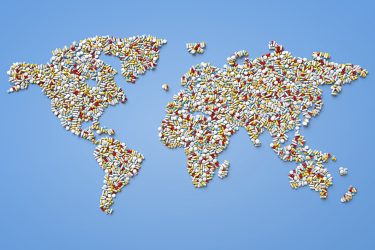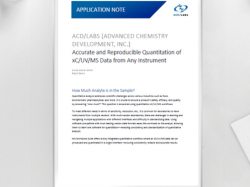Establishing a new pharmaceutical track and trace system in Dubai
Posted: 9 January 2020 | Victoria Rees (European Pharmaceutical Review) | No comments yet
Health authorities in Dubai have announced that they will introduce a new track and trace system to the emirate by mid-2020. This article investigates how this will help to improve the safety and quality of medicinal products.


One way to reduce the number of counterfeit or substandard drugs in the supply chain is to use a track and trace system. This allows a medicinal product to contain information about its origin and be located within the supply chain.1
A new tracking system is expected to be launched in Dubai, UAE later this year2 that will enable the Dubai Health Authority (DHA) to monitor medicines and hopefully improve patient safety. In other countries, traceability schemes similar to the developments in Dubai highlight the progresses made worldwide to reduce the frequency of poor-quality drugs.
Monitoring medicines
Track and trace systems enable authorities and those working within the supply chain to identify where specific medicines are. This includes a drug’s current and previous locations.


This challenge can be negated by individual packet serialisation, meaning single units have their own serial numbers to specify where they have been. Identification can therefore be placed at the batch level, on pallets and packs, on the outer packing of products and on the immediate packaging of medicines.1
One advantage of implementing track and trace processes into pharmaceutical supply chains is the reduction of counterfeit medicines. Last year saw the Dubai government consider new laws to fine those caught selling counterfeit drugs up to Dh1 million along with a five-year prison sentence,3 demonstrating the nation’s aim to reduce the danger of substandard drugs.
Other benefits to a formal track and trace scheme include improved product recalls and better logistic management, among others, as authorities can reveal more about products before they reach patients.
Measures in Dubai
Authorities in Dubai intend to use a track and trace policy to improve their management of the pharmaceutical supply chain by mid-2020.


In 2017, the DHA introduced a barcode labelling system in the emirate, which the new track and trace information will support. The barcodes are based on a GS1 data matrix encoding a medicine’s Global Trade Identifier Number (GTIN), expiration date and batch or lot number.4 The new policy will aid the regulatory body by including medicines from oversees as well as from the UAE. It will also affect the whole supply chain; from the manufacturing stage to the patient level.
Another benefit that the new system will provide is to aid in the prevention of drug shortages.5 Gaining more knowledge about the supply chain can help authorities identify where problems may lie, in order to address them. Also, as both UAE medicines and imported products can be classified, it may enable the DHA to find weaknesses in the supply chain by locating where disruptions originate.
In a statement, Dr Ali Al Sayed, the Director of the Pharmaceutical Services Department at the DHA, said the regulatory body works constantly on developing its pharmaceutical services to provide quality products to patients and achieve customer satisfaction.
…benefits to a formal track and trace scheme include improved product recalls and better logistic management”
He added that the authority has a clear plan to continue adopting the latest systems, which should keep their supply chain management as up to date as possible.6
Although in its early inception, Dubai will soon see the policy rolled out, with the aim to improve the authenticity of products within the pharmaceutical supply chain.
The future for track and trace
According to reports, the DHA is already in talks with manufacturing and pharmaceutical companies to implement their track and trace system, indicating that the future for pharmaceutical monitoring is evolving quickly.
The market for trace and trace solutions appears to be growing at a global scale, with research predicting it to be worth over $7 billion by 2026. The compound annual growth rate (CAGR) is also expected to grow by nearly 20 percent in the next six years.
Another area of the world where traceability systems are being utilised is India. Two-dimensional (2D) barcodes on pharmaceutical packaging will reportedly soon be mandatory in the country, which will contain information such as manufacturer location and batch number and can be read using software.8 During manufacture, a unique code is entered into a network that enables each product to be authenticated, meaning that the frequency of counterfeit drugs should be reduced.


Many countries around the world are therefore seeing the advantages of track and trace systems for the pharmaceutical industry, to ensure that the drugs provided to patients are safe. Other processes and reports can also be further implemented such as licensure standards, to gain even more insight into the industry.
Summary
Track and trace systems ensure the pharmaceutical supply chain is as secure as possible by providing information about the origin and locations of certain products. This allows regulatory bodies to govern the safe distribution of drugs by reducing the number of counterfeit medicines, making recalls easier and improving logistic management.
Dubai’s new process will enable the country’s regulatory body to effectively oversee the entire pharmaceutical supply chain and detect any issues that may arise. In a similar fashion to India and the US, the new system should afford Dubai the assurance of improved drug quality.
References
- [Internet]. Who.int. 2020 [cited 9 January 2020]. Available from: https://www.who.int/medicines/regulation/ssffc/mechanism/A69_41-en9-28.pdf
- Dubai’s medicine tracking system to tackle counterfeit drugs [Internet]. The National. 2020 [cited 9 January 2020]. Available from: https://www.thenational.ae/uae/health/dubai-s-medicine-tracking-system-to-tackle-counterfeit-drugs-1.955648
- UAE government considers tough new laws to tackle scourge of fake medicine [Internet]. The National. 2020 [cited 9 January 2020]. Available from: https://www.thenational.ae/uae/health/uae-government-considers-tough-new-laws-to-tackle-scourge-of-fake-medicine-1.838940
- Dubai pledges to roll out track-and-trace for drugs in 2020 [Internet]. Securingindustry.com. 2020 [cited 9 January 2020]. Available from: https://www.securingindustry.com/pharmaceuticals/dubai-pledges-to-roll-out-track-and-trace-for-drugs-in-2020/s40/a11141/#.Xg8wB0f7S70
- Dubai Health Authority to implement new medication tracking system in mid-2020 [Internet]. ArabianBusiness.com. 2020 [cited 9 January 2020]. Available from: https://www.arabianbusiness.com/technology/436172-dubais-dha-to-implement-new-medication-tracking-system-in-mid-2020
- DHA adopts “Track and Trace” system to monitor medications and ensure patient safety [Internet]. Zawya.com. 2020 [cited 9 January 2020]. Available from: https://www.zawya.com…
- The Track and Trace Solutions Market Garner Growth 18% – Media Releases – CSO | The Resource for Data Security Executives [Internet]. Www2.cso.com.au. 2020 [cited 9 January 2020]. Available from: https://www2.cso.com.au/mediareleases/37134/the-track-and-trace-solutions-market-garner/
- India to Track API Packs [Internet]. Contract Pharma. 2020 [cited 9 January 2020]. Available from: https://www.contractpharma.com/issues/2019-11-01/view_india-report/india-to-track-api-packs/
- DSCSA pilot project program: how to participate [Internet]. U.S. Food and Drug Administration. 2020 [cited 9 January 2020]. Available from: https://www.fda.gov/drugs/drug-supply-chain-security-act-dscsa/dscsa-pilot-project-program
Related topics
Distribution & Logistics, Drug Supply Chain, Labelling, Legal, Packaging, QA/QC, Regulation & Legislation, Serialisation, Supply Chain, Technology, Track and Trace
Related organisations
Dubai Health Authority (DHA), US Food and Drug Administration (FDA)









